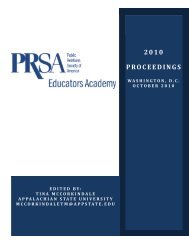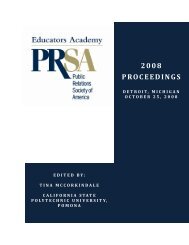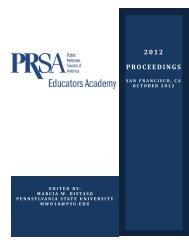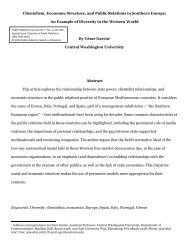2009 PROCEEDINGS - Public Relations Society of America
2009 PROCEEDINGS - Public Relations Society of America
2009 PROCEEDINGS - Public Relations Society of America
You also want an ePaper? Increase the reach of your titles
YUMPU automatically turns print PDFs into web optimized ePapers that Google loves.
Peru’s president-elect, Alan Garcia Perez, was popularly elected for a five-year<br />
term on June 2006 by 52.5% <strong>of</strong> the voters in his run<strong>of</strong>f with left-leaning, Ollanta Umala.<br />
Peru’s economic growth has been considerable over the last year, with a constant upward<br />
trend; the country has reached a level <strong>of</strong> 8% in 2007 (National Institute <strong>of</strong> Statistics and<br />
Informatics [INEI], 2008).<br />
In fact, multinational oil, gas and mining companies operating in Peru have<br />
received great opposition from several sides. The number <strong>of</strong> voices in Peru calling for an<br />
end to the extraction activity is great. The extractive industry is under much more<br />
scrutiny than are companies in other industries (Argentina Indy Media, 2005).<br />
In essence, the extraction <strong>of</strong> natural resources has become a source <strong>of</strong> great<br />
controversy in Peru. The mining sector, including, local and multinational companies, as<br />
well as trade organizations such as the Peruvian Mining, Petroleum and Energy <strong>Society</strong>,<br />
view the extraction activity as an opportunity for economic growth to local communities.<br />
According to this view, the mining activity provides a better future for peasants and their<br />
families, a better education, more jobs, and a better future.<br />
In the other hand, other groups such as, the Catholic Church, peasants’<br />
communities, NGO’s and others organizations from the civil society are opposed to<br />
mining activities (Ramos & Requera, 2006). In fact, local communities act as activist<br />
groups, becoming particularly troublesome to such organizations, since these<br />
communities <strong>of</strong>ten appeal to the media, their leaders, government, and other stakeholders<br />
to attempt to compel the organizations to change when the responses from the<br />
organizations do not satisfy them (De Echave, 2005).<br />
At present, civil society, the industry and government have come together in a<br />
national dialogue on mining and sustainable development and the ministry <strong>of</strong> the<br />
presidency has established an <strong>of</strong>fice <strong>of</strong> analysis and prevention <strong>of</strong> conflicts. Furthermore,<br />
the government has recently created the ministry <strong>of</strong> environment to oversee the<br />
application <strong>of</strong> environment standards to the mining industry. Thus, mining as well as gas<br />
companies have embraced higher international standards for environmental good practice<br />
and corporate social responsibility and have begun to make efforts to incorporate them<br />
into their regular operations and community relations. However, many <strong>of</strong> these efforts<br />
have yet to show positive signs on the ground, and the intensity <strong>of</strong> popular dissatisfaction<br />
and the general distrust <strong>of</strong> industry and governmental leaders <strong>of</strong>ten outstrips the pace <strong>of</strong><br />
these responses no matter how well intended and positive they may be.<br />
Other studies <strong>of</strong> corporations and activist group disputes have found similar<br />
difficulties in resolving conflicts. To many scholars and practitioners, this impasse<br />
represents a central problem in public relations (Murphy & Dee, 1992). However,<br />
conflicts and differences are resolved most efficiently when the participants develop<br />
compatible ground rules, and two-way symmetrical communication can provide this<br />
basis.<br />
The public relations domain is still in formative stage in Peru and there is no<br />
academic research on the field. When the key words “estudios en relaciones publicas en<br />
Peru” [public relations studies in Peru] or “investigacion en comunicaciones”<br />
[communication studies in Peru] are used to search the “Fuente Academica” or<br />
“Economia y Negocios” databases, there are no matches. These two databases are the<br />
most important Spanish language ones in Peru. “Fuente Academica” provides full text for<br />
260 scholarly Spanish language journals. Economia y Negocios is produced in Peru by<br />
26

















